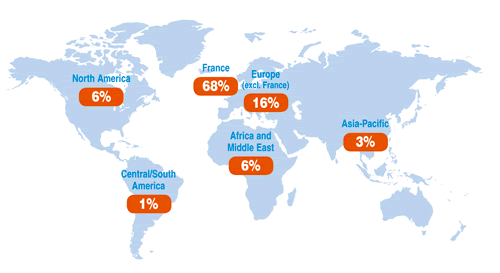 Bouygues
Bouygues
All data are collected in the Fiscal Year of 2008-2009.
Company Profile and History
The Bouygues group, founded by Francis Bouygues in 1952, has been run by Martin Bouygues, Chairman and Chief Executive Officer, since 1989. Initially focused on the building sector in the Paris area, Bouygues rapidly expanded its business to include property development and industrial precasting, operating across France through its regional subsidiaries. The 1970s saw Bouygues' first listing on the Paris Stock Exchange, its break into the civil works market (Parc des Princes stadium), the creation of Bouygues Offshore (maritime works and oil and gas contracting) and Maison Bouygues (catalogue homes).
In 1986, Bouygues became the world leader in the construction sector when it acquired France's largest roadworks group (Colas, Screg and Sacer). In 1987, Bouygues started to operate France's newly-privatised leading television channel TF1.
Throughout the 1990s, the Group pursued its development in construction on international markets as well as in television and launched Bouygues Telecom. Against the backdrop of a recession in France's property and construction sectors, the Group successfully redeployed its construction activities internationally (Hassan II Great Mosque in Casablanca, Sydney CityRail airport link, Hong Kong Convention Centre, etc.) and carried out major projects in France (Channel Tunnel, French National Library, Normandy Bridge, Stade de France stadium, etc.).
In the early 2000s, the Group refocused on two sectors: construction and telecoms/media. Bouygues Offshore was sold to Saipem in May 2002 and Saur to PAI partners in November 2004. The Group launched a public exchange offer in July 2000 for Colas, of which it currently owns 96.8%, and raised its stake in Bouygues Telecom to 89.5% in September 2007 (from 34% in 1996).
Having established a presence in sub-Saharan Africa in the 1970s (Ivory Coast, Benin, Burkina Faso), the Bouygues group started to focus on North Africa in the 1980s, winning major contracts in Morocco such as the Hassan II Mosque in Casablanca, Agadir airport and the Casablanca bay sanitation scheme. Bouygues Construction handed over the Tangiers container port in mid-2007 and is currently building the ferry port.
In Country Location
Boulevard De La Corniche, Phare D'el Hank, Morocco
Telephone: +22 39 79 80
Services and Products
Bouygues’ businesses focus on two sectors: construction, with Bouygues Construction (building, civil works and electrical contracting), Bouygues Immobilier (property development) and Colas (roads); and telecoms/media, with TF1 and Bouygues Telecom.
Number of Employees
53,700 employees worldwide; 2056 in Morocco
Financial Information
In 2008, its sales totalled €32.7 billion, of which €10.4 billion generated outside France. At 31 December 2008, its market capitalisation amounted to €10.4 billion.
Market Share

Business Objective
“To deliver innovative solutions for the construction, design, operation, maintenance and financing of buildings and infrastructures”
Business Model
Operating in over eighty countries, it combines the strength of a large corporation and the flexibility of a network of companies organised in seven complementary entities. Its ppolicy is based on innovation, research and development. The culture of innovation at Bouygues is directed towards the creation of high value-added products and services in all the Group's businesses. The Group's innovation approach focuses on the development of new products and materials and, to a very considerable extent, involves combining products and services in order to provide an integrated response to customer demand.
Innovation initiatives are closely linked to the particular features of each business and concentrate on finding operational solutions. Most of the Group's research, development and innovation teams are housed within its subsidiaries.
The key features of the Bouygues group's innovation approach are: involving as many staff as possible in the quest for innovative solutions; promoting exchanges between players inside and outside the Group.
Bouygues Construction focuses on amongst others public-private-partnerships concessions.
PPPs enable a public authority (the state, a local government agency, etc.) to call in a private-sector partner to finance, design, build, operate and maintain a project in return for a rent or toll. The partner is thus remunerated over the long term. Advantages for the customer include having a single organisation to deal with, maintaining mastery of overall costs, reducing construction time and contractually guaranteeing top quality service. Bouygues Construction is one of the leading players in these kind of contracts, thanks to its multi-disciplinary project teams and its expertise in financial engineering.
Ownership of Business
Bymaro Casablanca/Morocco (99.96%); Colas du Maroc and its subsidiaries Casablanca/Morocco (96.77%)
Benefits Offered and Relations with Government
To obtain construction permits takes 19 procurers and 163 days. Cost is 263.7% of income per capita. Construction companies are under constant pressure from government to comply with inspections, with licensing and safety regulations, from customers to be quick and cost-effective.
Bouygues was awarded the construction of the first section of the transshipment port TangerMed. The EUR225m contract attracted the interest of major international groups, and Bouygues won it over a list of six international consortia. The choice of Bouygues was widely perceived as having some political implications, especially as the same group had been denied the construction of the Tanger Atlantique transshipment port. The latter was due to be built on the Atlantic coast until the government decided to change the location of the project to the Mediterranean coast and consequently called off its contract with the French group.
Product Development
In 2009 Bouygues Travaux Publics and Bymaro, two subsidiaries of Bouygues Construction, signed a contract for the design and construction of a second deep-water port complex in Tangier. The 825 million euro operation [of which 335 million euros for Bouygues Construction] will be carried out by a consortium with Saipem, Besix, and Somagec. The works are expected to start in the first half of 2010 and will run for close to four and half years with up to 1,500 people working on site at peak times.
The extension to Tanger-Med would make it the biggest port in the Mediterranean and enable the country to capture a bigger slice of container traffic through the Strait of Gibraltar that links the Mediterranean to the Atlantic.




